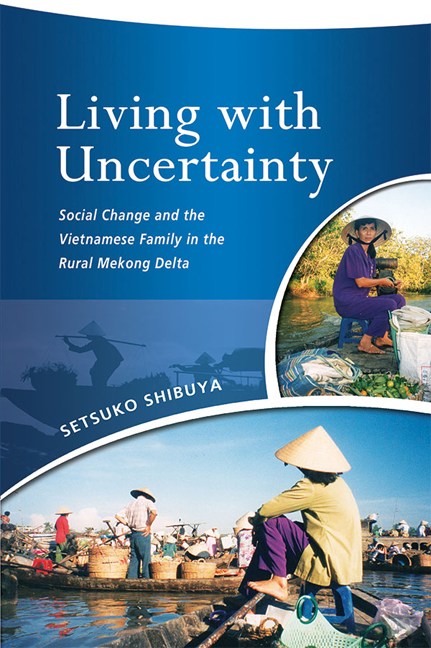Book contents
- Frontmatter
- Contents
- Acknowledgements
- 1 Introduction: Family and Society in Vietnam
- 2 On the Bank of the Mekong River
- 3 Family as the Social Unit
- 4 Farming Together
- 5 Working Outside of the Family
- 6 Education of Children and the Future
- 7 Feeling Poor
- 8 Social Change and the Family in the Rural Mekong Delta
- Bibliography
- Index
- About the Author
1 - Introduction: Family and Society in Vietnam
Published online by Cambridge University Press: 19 May 2017
- Frontmatter
- Contents
- Acknowledgements
- 1 Introduction: Family and Society in Vietnam
- 2 On the Bank of the Mekong River
- 3 Family as the Social Unit
- 4 Farming Together
- 5 Working Outside of the Family
- 6 Education of Children and the Future
- 7 Feeling Poor
- 8 Social Change and the Family in the Rural Mekong Delta
- Bibliography
- Index
- About the Author
Summary
When I first travelled to Can Tho in 1997, a province about 170 km from Ho Chi Minh City in southern Vietnam, the family life of farmers in the rural Mekong Delta was still hidden from me behind a veil. While I looked for a field site and waited in Can Tho City for permission from the local government to conduct research in a rural area of the province, I spoke with some college students at Can Tho University, the main educational institution of the Delta. These urbanites often believed that rural life was different from theirs. When asked about family life in Vietnam, many people would give answers that reflected these assumptions. For instance, explaining family structure, the students said, “traditionally, the family is extended, but now more families are nuclear. Things are changing. In the city, families are nuclear, but in the countryside, they still are extended.” Or, “in the city, people have only one or two children, but in the villages they have five to seven, or more”, “in urban areas, any child may take care of the old parents; in rural areas, they follow tradition, and the youngest son is especially responsible for supporting the parents when they are old”, and “in the city, women get married at twenty-four or twenty-five, but in the countryside they marry early, at around eighteen.”
These statements reveal the common assumption in urban areas that life in rural areas is more “traditional” than life in an urban setting. It is a widely shared view that rural life retains traditional patterns, family structures and relations, while life in the city is changing rapidly with modernization. Moden, or modern, is a word often used by contemporary Vietnamese, especially urban dwellers. The urbanites think of themselves as living in a time of transition from tradition to modernization, and perceive the world around them in terms of the contrasting framework of “modern vs. traditional”. Often, “modern” is associated with “western”, “foreign”, and “new”, while “traditional” refers to what is perceived as “Vietnamese”, “indigenous”, and “old”. The words “countryside” (nong thon) or “homeland” (que huong) are used with nostalgic feelings as a place where their old good life is still preserved. One interesting example I liked is packets of postcards sold at post offices in towns which are named “countryside” or “homeland” and have pictures of the rural life.
- Type
- Chapter
- Information
- Living with UncertaintySocial Change and the Vietnamese Family in the Rural Mekong Delta, pp. 1 - 21Publisher: ISEAS–Yusof Ishak InstitutePrint publication year: 2015



